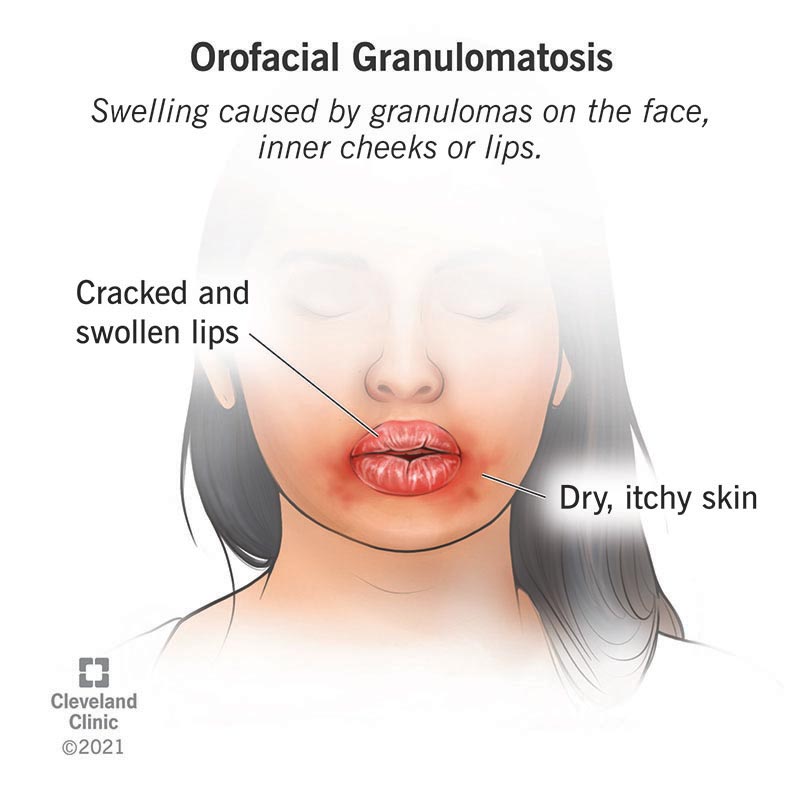Orofacial granulomatosis is a rare skin condition that causes swelling in your lips, mouth and face. It may be associated with other conditions, such as Crohn’s disease. Swelling is usually soft and painless at first, then more firm and painful over time. Corticosteroids and other treatments may help manage symptoms.
Advertisement
Cleveland Clinic is a non-profit academic medical center. Advertising on our site helps support our mission. We do not endorse non-Cleveland Clinic products or services. Policy

Image content: This image is available to view online.
View image online (https://my.clevelandclinic.org/-/scassets/images/org/health/articles/23317-orofacial-granulomatosis)
Orofacial granulomatosis is a rare skin condition. It may cause lumps that you can see or feel on your face, inner cheeks or lips.
Advertisement
Cleveland Clinic is a non-profit academic medical center. Advertising on our site helps support our mission. We do not endorse non-Cleveland Clinic products or services. Policy
Orofacial granulomatosis that affects only your lips is known as:
Orofacial granulomatosis isn’t common, affecting less than 1% of people. Although it can occur at any age, it’s more common in people who are 20 to 40 years old.
The condition can occur alone (idiopathic) or with other conditions, such as:
Orofacial granulomatosis is also often associated with Melkersson-Rosenthal syndrome, a neurological condition that involves three symptoms:
Scientists don’t know what causes orofacial granulomatosis. But they’re researching whether it’s related to:
They believe that swelling occurs when granulomas block your lymphatic system, leading to lymphedema.
The most common early symptom of orofacial granulomatosis is soft, painless swelling of one or both lips. It occurs in your lower lip more often than in your upper lip. The swelling comes and goes, and it can last weeks or months. Swelling may eventually become rubbery, firm, painful and permanent.
Advertisement
Related symptoms may include:
Orofacial granulomatosis may spread to other areas of your face, but it isn’t contagious.
To diagnose this condition, a dermatologist must take a small sample of the swollen tissue (biopsy). A pathologist will analyze the tissue and confirm whether it contains noncaseating granulomas.
The healthcare provider may order other tests to diagnose related conditions, including:
Your healthcare provider might recommend treatment if the condition causes:
The most common treatment involves corticosteroids. The type of steroid prescribed depends on how severe the condition is:
Your healthcare provider also may recommend:
Unfortunately, there’s no cure for orofacial granulomatosis yet. Treatments aim to manage symptoms and make people more comfortable.
Treatment for orofacial granulomatosis is complex. Current strategies may work slowly, over months or years. Sometimes, they don’t help at all.
Rarely, the condition may suddenly go away on its own (spontaneous remission).
Because scientists don’t yet understand what causes orofacial granulomatosis, there’s no proven way to prevent it.
Living with orofacial granulomatosis can be challenging. You may have trouble coping with the way you look or the way your mouth functions. Some strategies can help you cope with the psychological effects of the condition:
Advertisement
You should call your healthcare provider right away if you develop weakness or paralysis in any part of your face. Also, report any ridges or grooves in your tongue. These symptoms might be signs of Melkersson-Rosenthal syndrome or another disorder.
Orofacial granulomatosis is a rare skin condition. It causes swelling in your lips, mouth and other parts of your face. Talk to your healthcare provider if you have any facial swelling so you can be tested and receive treatment. There’s no cure for orofacial granulomatosis, but corticosteroids and other treatments may reduce symptoms.
Advertisement

Sign up for our Health Essentials emails for expert guidance on nutrition, fitness, sleep, skin care and more.
Learn more about the Health Library and our editorial process.
Cleveland Clinic’s health articles are based on evidence-backed information and review by medical professionals to ensure accuracy, reliability and up-to-date clinical standards.
Cleveland Clinic’s health articles are based on evidence-backed information and review by medical professionals to ensure accuracy, reliability and up-to-date clinical standards.
Every day, people see your skin, hair and nails. At Cleveland Clinic, our expert and caring dermatology team will make sure they’re healthy and strong.
